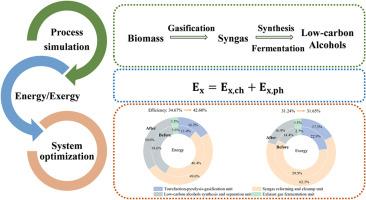Process simulation, thermodynamic and system optimization for the low-carbon alcohols production via gasification of second-generation biomass
IF 9
1区 工程技术
Q1 ENERGY & FUELS
引用次数: 0
Abstract
Biomass-to-liquid fuels technology offers a promising method for high-value biomass conversion, addressing environmental toxicity and fossil fuel non-renewability. However, challenges such as low system efficiency and identifying efficiency losses persist. In this study, a comprehensive process model of a low-carbon alcohols production system via biomass gasification was developed, based on the first demonstration project in China. The innovation of this study lies in its detailed experimental validation, as the model simulation was performed using laboratory data and verified with pilot-scale platform data ensuring high accuracy. Additionally, the study conducted a thorough sensitivity analysis of system parameters, energy, and exergy assessments to find the proper operating conditions, including equivalent ratio, biomass type, and reactor temperature and pressure. The simulation results demonstrated an energy efficiency of 34.67 % and an exergy efficiency of 31.24 %. Through operating parameters and heat recovery measures, these efficiencies increased by 11.66 % and 8 %, respectively. This research not only obtains improved operating parameters for the pilot-scale platform but also provides actionable insights for enhancing the yields of target products and upgrading low-grade energy utilization. These findings offer valuable guidance for the commercialization of bio-syngas alcohols production systems, highlighting significant advancements in efficiency and system performance.

通过气化第二代生物质生产低碳酒精的过程模拟、热力学和系统优化
生物质转化为液体燃料技术为高价值生物质转化提供了一种前景广阔的方法,解决了环境毒性和化石燃料不可再生的问题。然而,系统效率低和识别效率损失等挑战依然存在。本研究以中国首个示范项目为基础,建立了生物质气化低碳酒精生产系统的综合工艺模型。本研究的创新之处在于其详细的实验验证,因为模型模拟是利用实验室数据进行的,并通过中试规模平台数据进行了验证,确保了高精度。此外,该研究还对系统参数、能量和放能评估进行了全面的敏感性分析,以找到合适的运行条件,包括当量比、生物质类型、反应器温度和压力。模拟结果表明,能源效率为 34.67%,放能效率为 31.24%。通过操作参数和热回收措施,这些效率分别提高了 11.66 % 和 8 %。这项研究不仅改进了中试规模平台的运行参数,还为提高目标产品产量和提升低品位能源利用率提供了可行的见解。这些研究结果为生物合成气酒精生产系统的商业化提供了宝贵的指导,突出了在效率和系统性能方面的显著进步。
本文章由计算机程序翻译,如有差异,请以英文原文为准。
求助全文
约1分钟内获得全文
求助全文
来源期刊

Energy
工程技术-能源与燃料
CiteScore
15.30
自引率
14.40%
发文量
0
审稿时长
14.2 weeks
期刊介绍:
Energy is a multidisciplinary, international journal that publishes research and analysis in the field of energy engineering. Our aim is to become a leading peer-reviewed platform and a trusted source of information for energy-related topics.
The journal covers a range of areas including mechanical engineering, thermal sciences, and energy analysis. We are particularly interested in research on energy modelling, prediction, integrated energy systems, planning, and management.
Additionally, we welcome papers on energy conservation, efficiency, biomass and bioenergy, renewable energy, electricity supply and demand, energy storage, buildings, and economic and policy issues. These topics should align with our broader multidisciplinary focus.
 求助内容:
求助内容: 应助结果提醒方式:
应助结果提醒方式:


